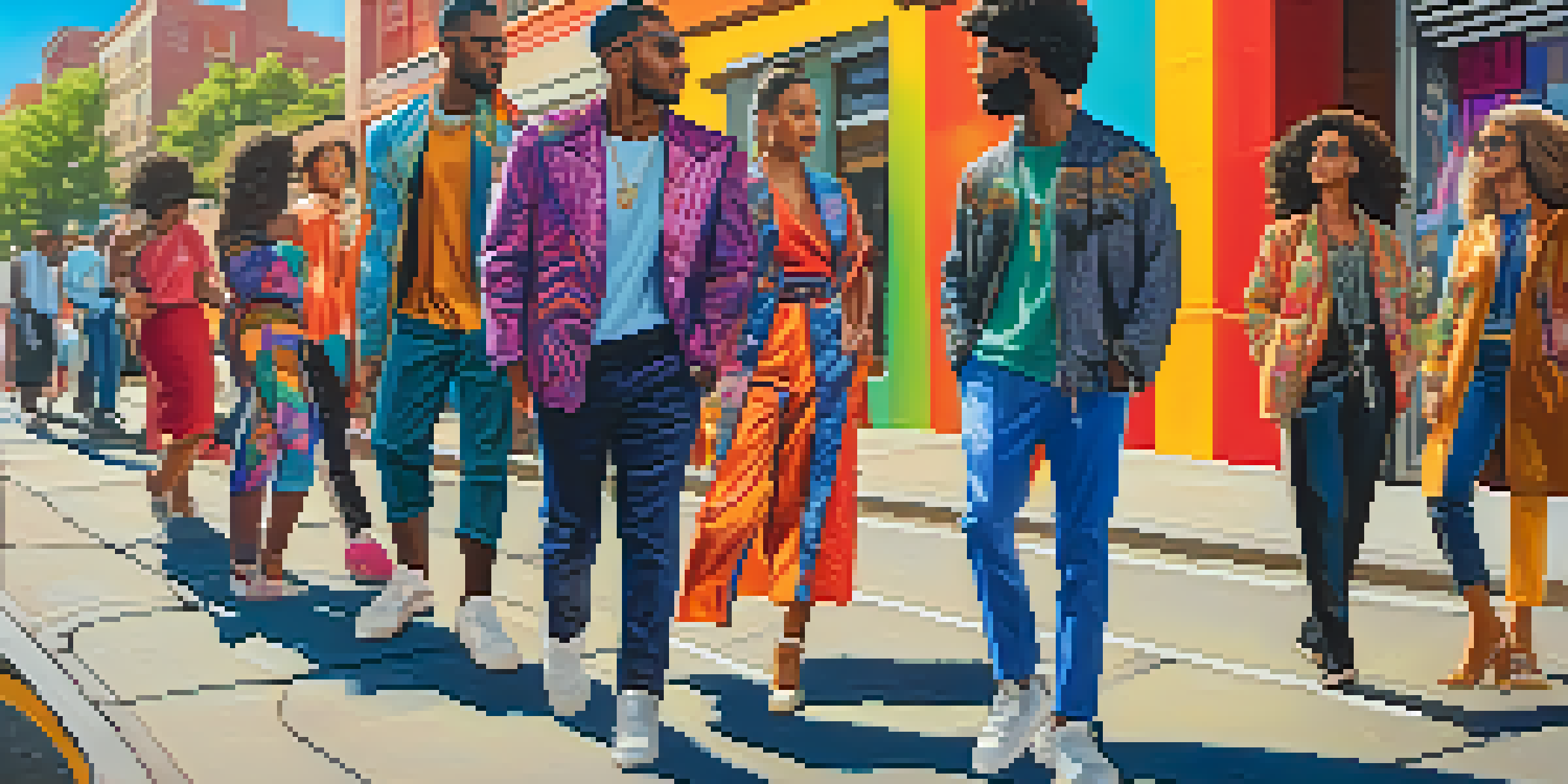Fashion and Identity: How Your Style Reflects Who You Are

The Connection Between Fashion and Personal Identity
Fashion is more than just clothing; it’s a powerful form of self-expression. Every outfit tells a story about the person wearing it, reflecting their personality, beliefs, and experiences. Just as a painter uses colors to convey emotions, we use fashion to communicate who we are to the world.
Fashion is the armor to survive the reality of everyday life.
When you choose what to wear, you’re not just picking fabric; you’re making a statement about your identity. For instance, someone who embraces bright colors and bold patterns may be seen as adventurous and outgoing, while someone who opts for classic and neutral tones might come across as more reserved and traditional. These choices become a visual language, speaking volumes before a word is ever spoken.
Moreover, our fashion choices can evolve as we grow and change, mirroring our personal journeys. Just like a caterpillar transforms into a butterfly, our style can reflect significant life changes, beliefs, or even new phases in our lives. This fluidity in fashion allows us to continually express our evolving identities.
Cultural Influences on Fashion Choices
Cultural background plays a vital role in shaping our fashion choices. The clothes we wear often reflect our heritage, traditions, and even the communities we belong to. For example, someone from a culture that values vibrant textiles may embrace those elements in their wardrobe, showcasing pride in their roots.

Additionally, fashion can serve as a bridge between cultures, allowing individuals to explore and adopt styles from different parts of the world. This fusion often leads to unique personal styles that celebrate diversity and foster understanding. Think of someone who pairs a traditional kimono with modern accessories; they’re not just making a fashion statement but also honoring their culture while embracing contemporary influences.
Fashion Reflects Personal Identity
Our clothing choices serve as a visual language that expresses our personality, beliefs, and experiences.
However, it’s essential to approach cross-cultural fashion with respect and authenticity. Appropriating styles without understanding their significance can lead to misunderstandings and offend those within the culture. Therefore, engaging with and appreciating the stories behind different styles can enhance our own fashion narratives.
Fashion as a Form of Empowerment
Many people find empowerment through their fashion choices. Wearing an outfit that makes you feel confident can boost your self-esteem and impact your day. For example, think about how slipping into a well-fitted suit might transform someone’s demeanor, making them feel ready to conquer the world.
Style is a way to say who you are without having to speak.
Fashion also allows for the breaking of societal norms and expectations. By choosing styles that challenge conventional beauty standards, individuals can assert their identity and promote body positivity. This rebellion against the norm not only empowers the wearer but can inspire others to embrace their unique styles too.
Furthermore, fashion can serve as a platform for advocacy. Many designers and influencers use their visibility to promote messages about identity, diversity, and acceptance. This blend of creativity and activism can foster a community where people feel seen and valued for who they are.
The Role of Social Media in Fashion Identity
In today’s digital age, social media has transformed how we express our fashion identities. Platforms like Instagram and TikTok allow individuals to showcase their unique styles, connect with like-minded people, and even influence trends. This accessibility empowers everyone, regardless of background, to share their fashion journey.
However, social media can also create pressure to conform to certain styles or trends, leading to a paradox of self-expression. While it offers a space for individuality, it can sometimes overshadow personal authenticity, pushing people to dress for likes rather than for themselves. It’s crucial to remember that fashion should be about personal joy, not just social validation.
Cultural Roots Shape Fashion Choices
Cultural backgrounds greatly influence our fashion, allowing us to celebrate our heritage while also exploring diverse styles.
As we navigate the world of fashion on social media, it’s essential to curate a feed that inspires rather than pressures. Following diverse voices in fashion can broaden our perspectives and encourage us to celebrate our unique styles, reminding us that there’s no single way to express who we are.
Fashion Trends and Their Impact on Identity
Fashion trends often reflect societal values and changes, influencing how we perceive ourselves and others. For instance, the rise of sustainable fashion has encouraged many to rethink their consumption habits and embrace mindful choices that align with their values. Wearing eco-friendly brands can signal a commitment to the environment and social responsibility.
Yet, trends can also create a sense of belonging or exclusion. People often gravitate toward styles that are currently popular, wanting to fit in with their peers or social circles. This desire to conform can lead to a dilution of personal identity, as individuals may sacrifice their unique tastes to adhere to what’s trendy.
Ultimately, it’s about finding a balance between embracing trends and staying true to oneself. The most impactful fashion statements often come from blending personal style with current trends, creating a unique identity that resonates with both the wearer and the world around them.
Fashion Icons and Their Influence on Identity
Fashion icons have long played a significant role in shaping our understanding of style and identity. Figures like Audrey Hepburn or David Bowie not only influenced fashion trends but also challenged societal norms, encouraging people to express their individuality. Their legacies continue to inspire new generations to explore their personal style.
These icons often embody qualities that resonate with many, whether it’s confidence, creativity, or fearlessness. When we admire someone’s style, we’re often drawn to the stories and identities they represent. This admiration can empower us to experiment with our styles, helping to forge our identities in the process.
Fashion Empowers Self-Expression
Through fashion, individuals can assert their identities, challenge societal norms, and promote messages of acceptance and diversity.
However, while it’s great to take inspiration from fashion icons, it’s essential to remember that authenticity is key. Rather than trying to replicate someone else's style, we should focus on what elements resonate with us, crafting a look that reflects our unique identities while celebrating those we admire.
Fashion and the Journey of Self-Discovery
For many, fashion is a journey of self-discovery. As we experiment with different styles, we often uncover aspects of our identities that we didn’t know existed. This playful exploration can be a transformative experience, allowing us to express our evolving selves.
The process of trying on different looks can be both fun and enlightening. It’s like picking up a new hobby; each new outfit allows us to explore different facets of our personalities. Perhaps you find that you feel most at home in vintage clothing, which connects you to a sense of nostalgia or history.

Ultimately, this journey of self-discovery through fashion reminds us that identity is not static. Just as our tastes change, so too does our understanding of who we are. Embracing this fluidity allows us to celebrate our growth and the many layers of our identities.